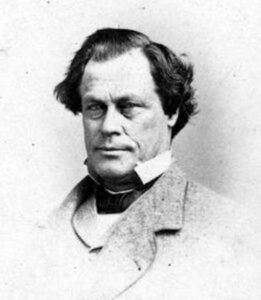
Owen Lovejoy
*Owen Lovejoy was born on this date in 1811. He was a White-American lawyer, Congregational minister, abolitionist, and politician.
Born in Albion, Maine, Owen Lovejoy was one of five brothers born to Elizabeth (Patee) and Daniel Lovejoy, a Congregational minister and farmer. He worked with his family on the farm until he was 18, and his parents encouraged his education. Lovejoy attended Bowdoin College from 1830 to 1833. He studied law but never practiced.
Lovejoy migrated to Alton, Illinois, where his older brother Elijah Lovejoy lived. He was present on the night of November 7, 1837, when his brother Elijah was murdered while trying to defend the printing press of the Illinois Anti-Slavery Society from an angry mob.
After his brother's death, he was also a "conductor" on the Underground Railroad. Lovejoy served as pastor of the Congregational Church in Princeton, Illinois, from 1838 to 1856. During these years, he also organized several of the 115 anti-slavery Congregational churches in Illinois begun by the American Missionary Association, founded in 1846. His activities brought him increasing public prominence. In 1854, Lovejoy was elected a member of the Illinois State Legislature. He worked to form the Republican Party in the state. In 1856, he was elected as a Republican from Illinois as a Representative to the 35th United States Congress and succeeding Congresses, serving from March 4, 1857, until his death.
In February 1859, Lovejoy responded to the Democrats' charges that by aiding runaway slaves and opposing slavery, he was a "negro stealer," saying on the floor of Congress: Proclaim it upon the house-tops! Write it upon every leaf that trembles in the forest! Make it blaze from the sun at high noon and shine forth in the radiance of every star that bedecks the firmament of God. Let it echo through all the arches of heaven and reverberate and bellow through all the deep gorges of hell, where slave catchers will be very likely to hear it. Owen Lovejoy lives at Princeton, Illinois, three-quarters of a mile east of the village, and he aids every fugitive that comes to his door and asks it. Thou invisible demon of slavery! Dost, thou think to cross my humble threshold and forbid me to give bread to the hungry and shelter to the houseless? I bid you defiance in the name of my God.
Lovejoy was a platform speaker in support of Abraham Lincoln in the debates with Stephen A. Douglas. While in Congress, he "introduced the final bill to end slavery in the District of Columbia," long a goal of the American Anti-Slavery Society. He also helped gain passage of legislation prohibiting slavery in the territories. In an April 5, 1860, speech before the U.S. House of Representatives, Lovejoy criticized the Democrats and their racist justifications for supporting slavery, saying: The principle of enslaving human beings because they are inferior is this. If a man is a cripple, trip him up; if he is old and weak, and bowed with the weight of years, strike him, for he cannot strike back; if idiotic, take advantage of him; and if a child, deceive him. This, sir, this is the doctrine of Democrats and the doctrine of devils as well, and there is no place in the universe outside the five points of hell and the Democratic Party where the practice and prevalence of such doctrines would not be a disgrace.
As Lovejoy gave his speech condemning slavery, several Democrats in the audience, such as Roger Atkinson Pryor, became irate and incensed. Profoundly objecting to Lovejoy's anti-slavery remarks, the Democrats, brandishing pistols and canes, threatened him with physical harm, to which the Republicans present pledged to defend Lovejoy if the Democrats attempted to attack him. He was one of Lincoln's few steadfast Congressional supporters during the American Civil War.
Owen Lovejoy died in Brooklyn, New York, on March 25, 1864. His body was returned to Illinois for burial at Oakland Cemetery in Princeton. When he died, Lincoln stated: "I've lost the best friend I had in the House of Representatives."